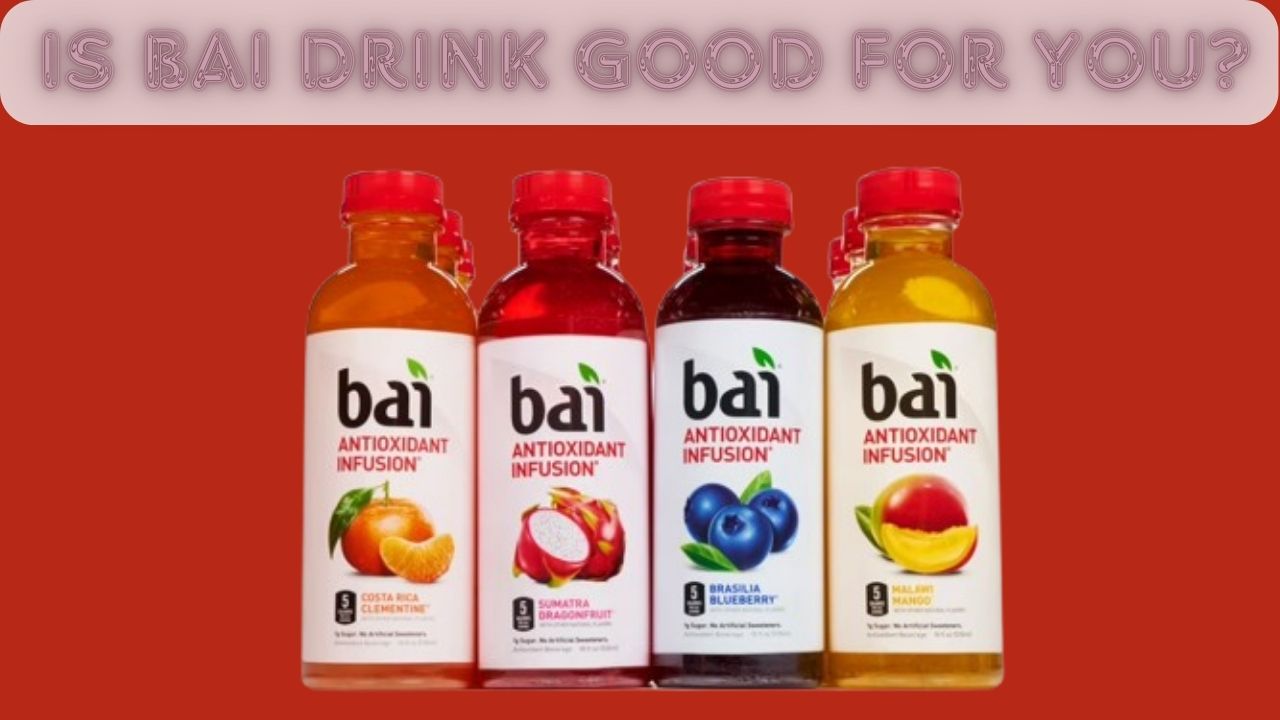Bai drinks have gained significant popularity due to their unique combination of flavors, natural ingredients, and marketing as a healthy alternative to sugary beverages. But is Bai drink good for you as it claims? In this article, we’ll dive deep into Bai drinks, examining their nutritional content, benefits, potential drawbacks, and more. Let’s find out if this trendy drink is a smart addition to your diet.
Table of Contents
What Is Bai Drink?
Bai is a brand that offers a range of low-calorie, antioxidant-infused beverages. These drinks are primarily marketed as a healthier alternative to sugary sodas and juices. “Bai” means “pure” in Mandarin, aligning with the brand’s promise to deliver clean and refreshing drinks. Bai drinks come in various fruit flavors, some of the most popular being Brasilia Blueberry, Panama Peach, and Costa Rica Clementine.
The drinks are made from a combination of natural flavors, sweeteners like stevia, and an infusion of antioxidants derived from coffee fruit. Bai beverages are also lightly caffeinated, adding a bit of an energy boost without the jitters commonly associated with high-caffeine drinks. Is Bai Drink Good For You
Is Bai Drink Good for You?
Bai drinks can be a good option for those seeking a flavorful, low-calorie alternative to sugary beverages. Packed with antioxidants from coffee fruit extract and a moderate amount of caffeine, Bai offers a gentle energy boost while supporting hydration.
Does Bai Drink Contain Caffeine?
Yes, Bai drinks do contain caffeine, although the amount is relatively low compared to coffee or energy drinks. Each bottle has about 55 milligrams of caffeine, which is roughly equivalent to a cup of green tea. For most people, this amount of caffeine provides a gentle energy boost without the jittery side effects that come with stronger caffeinated beverages.
Caffeine-Related Health Benefits
Caffeine in Bai, in moderation, can improve mental alertness, enhance mood, and boost metabolism. Bai’s caffeine content is low enough that most people can enjoy the drink without worrying about overdoing it on caffeine.
Is Bai Drink Sugar-Free?
While Bai drinks are marketed as low-sugar beverages, they are not completely sugar-free. Each bottle contains about 1 gram of sugar, but the primary sweeteners used are stevia and erythritol, both of which are natural sugar alternatives.
Effects of Erythritol and Stevia on Health
Erythritol is a sugar alcohol that has almost no calories and doesn’t affect blood sugar levels, making it a great option for people managing diabetes or those on low-carb diets. Stevia, derived from the leaves of the stevia plant, is a zero-calorie sweetener that’s often considered a healthier alternative to artificial sweeteners like aspartame.
Nutritional Information of Bai Drink
One of the major selling points of Bai drinks is their low-calorie content. A typical 530 ml (18 fl oz) bottle of Bai contains only about 10 calories. This is largely due to the use of natural sweeteners like stevia and erythritol, which have little to no caloric value.
Bai drinks are also packed with antioxidants, especially from coffee fruit extract. Additionally, they contain some vitamins and minerals, although they aren’t a significant source of daily nutrients. Here’s a breakdown of the key nutritional components of a Bai drink:
| Nutritional Fact | Amount per Serving |
|---|---|
| Calories | 10 |
| Total Carbohydrates | 12g |
| Sugars | 1g |
| Caffeine | 55mg |
| Antioxidants | From coffee fruit |
Do You Know?
👉 Does Celsius Drink Have Caffeine?
👉 Is Ghost Energy Drink Good for You?
Benefits of Bai Drink
So, what makes Bai a healthy choice? Here are some key benefits:
✔ Hydration
Since Bai drinks are water-based, they can help you stay hydrated, just like any other liquid. The subtle fruit flavors can encourage people who struggle to drink plain water to up their intake.
✔ Antioxidant Properties
One of the standout features of Bai drinks is their high antioxidant content. The coffee fruit extract used in Bai is packed with antioxidants, which help combat oxidative stress in the body. This can support immune function and overall cellular health.
✔ Low-Calorie Alternative
Bai drinks are a fantastic option for those looking to cut back on sugary sodas and juices. With only 1 gram of sugar per serving, they satisfy your sweet tooth without the negative impacts of high sugar intake, like weight gain or blood sugar spikes.
Potential Side Effects of Bai Drink
While Bai drinks are generally safe, some people may experience side effects from certain ingredients. Erythritol, for example, can cause digestive issues like bloating or gas in large quantities. Some people may also be sensitive to caffeine or stevia, which can lead to headaches or a laxative effect.
1. Digestive Issues from Erythritol
Erythritol, a sugar alcohol used as a sweetener in Bai drinks, can cause digestive problems for some people. While it’s generally well-tolerated, consuming large amounts may lead to bloating, gas, or even diarrhea. This occurs because the body does not fully absorb erythritol and can ferment in the digestive tract. If you’re sensitive to sugar alcohol, it’s best to monitor your intake to avoid these uncomfortable symptoms.
2. Caffeine Sensitivity
Bai drinks contain about 55 milligrams of caffeine per bottle, which is lower than coffee but still enough to cause issues for those who are sensitive to caffeine. People with caffeine sensitivity may experience side effects like jitteriness, increased heart rate, or trouble sleeping after consuming Bai. If you’re prone to caffeine-related side effects, limiting your intake or opting for caffeine-free beverages may be a safer choice.
3. Sweetener Sensitivity (Stevia)
While stevia is a natural, zero-calorie sweetener, some individuals may experience mild side effects from consuming it. These can include headaches, nausea, or a bitter aftertaste in sensitive individuals. Though stevia is generally recognized as safe, if you notice adverse reactions after drinking Bai, it might be due to a sensitivity to this sweetener. Consider reducing your intake if these symptoms persist.
Bai Drink vs. Other Healthy Beverages
Bai Drink vs. Coconut Water
Both Bai drinks and coconut water are low in calories and offer hydration, but coconut water contains more electrolytes, making it a better choice for post-workout hydration. On the other hand, Bai is packed with antioxidants, giving it an edge in supporting immune health.
Bai Drink vs. Flavored Water
While flavored waters typically contain artificial sweeteners and additives, Bai drinks offer a cleaner option with natural sweeteners and real fruit flavors. Additionally, Bai provides the added benefit of antioxidants and a small caffeine boost.
Antioxidants in Bai Drinks
The antioxidants in Bai drinks come from coffee fruit, which is a rich source of polyphenols and other compounds that help neutralize harmful free radicals in the body. Antioxidants are known for their role in reducing the risk of chronic diseases like heart disease and certain cancers.
Is Bai Drink Safe for Kids?
In small amounts, Bai drinks can be safe for children. However, parents should be cautious of the caffeine content. Even though the amount of caffeine is low, it may still not be suitable for younger children. Always consult with a pediatrician if you’re unsure.
Who Should Avoid Bai Drinks?
Individuals sensitive to caffeine or sugar alcohols (like erythritol) might want to limit their intake of Bai drinks. Additionally, those on specific medical diets or with digestive issues should consider how erythritol or stevia affects them before consuming Bai regular.
Are Bai Drinks Good for Weight Loss?
Since Bai drinks are low in calories and sugar, they can be a good addition to a weight-loss plan. They can help satisfy sweet cravings without derailing your calorie goals. However, it’s important to remember that no single drink will magically cause weight loss—it’s all about balance and making healthy choices overall. Is Bai Drink Good For You
Popularity of Bai Drinks
Bai has built a loyal customer base due to its flavorful drinks and healthy marketing. Many consumers appreciate that Bai offers a tasty alternative to sugary sodas, while others enjoy the antioxidant boost. Customer reviews are generally positive, with common praises being the refreshing taste, low-calorie content, and energy boost from the caffeine.
Daily Intake of Bai Drink
It’s generally safe to consume 1-2 Bai drinks per day, depending on your sensitivity to caffeine and sugar alcohols. Like any beverage, moderation is key to avoiding potential side effects such as digestive discomfort or caffeine overconsumption.
Conclusion
So, is Bai drink good for you? Overall, Bai drinks offer a low-calorie, flavorful alternative to sugary beverages, with added health benefits from antioxidants and a moderate amount of caffeine. However, like any product, it’s important to consume Bai drinks in moderation and be mindful of how your body reacts to ingredients like erythritol and caffeine. Is Bai Drink Good For You
Frequently Asked Questions
1. Can Bai drinks help with hydration?
Yes, Bai drinks can help with hydration since they are primarily water-based. The added fruit flavors can make them a more enjoyable alternative to plain water for some people. However, they should not fully replace regular water intake for optimal hydration.
2. Are Bai drinks keto-friendly?
Yes, Bai drinks are keto-friendly because they are low in both carbohydrates and sugar. They use erythritol and stevia as sweeteners, which do not spike blood sugar levels. This makes them a suitable option for individuals on a ketogenic diet.
3. Do Bai drinks provide a significant energy boost?
Bai drinks contain about 55 mg of caffeine, offering a mild energy boost, similar to a cup of green tea. While it’s not as strong as coffee, it can provide enough energy for a slight pick-me-up during the day. However, it’s not designed as a primary energy drink.
4. Can I drink Bai every day?
Yes, you can drink Bai every day, but it’s important to do so in moderation. The low-calorie, low-sugar content makes it a healthier daily choice, but overconsumption could lead to excessive intake of caffeine or erythritol. Limiting to 1-2 bottles a day is generally safe for most people.
5. Is Bai safe for pregnant women?
Pregnant women should consult their doctor before consuming Bai due to its caffeine content. While the caffeine level is relatively low, even small amounts of caffeine can affect pregnancy. Always check with a healthcare provider to ensure it fits into your prenatal diet.

